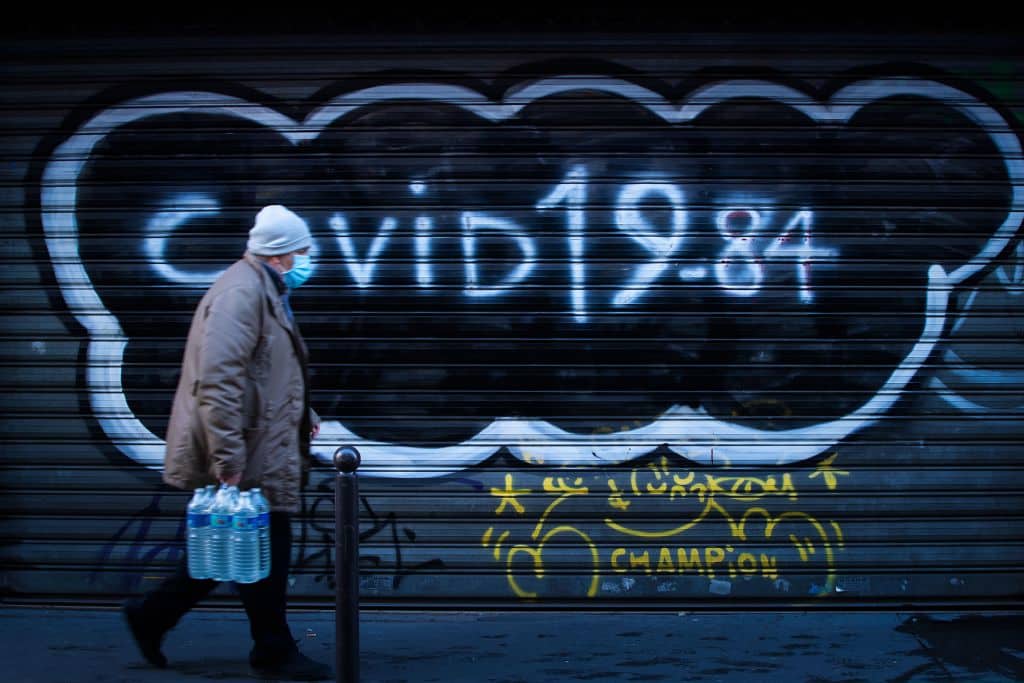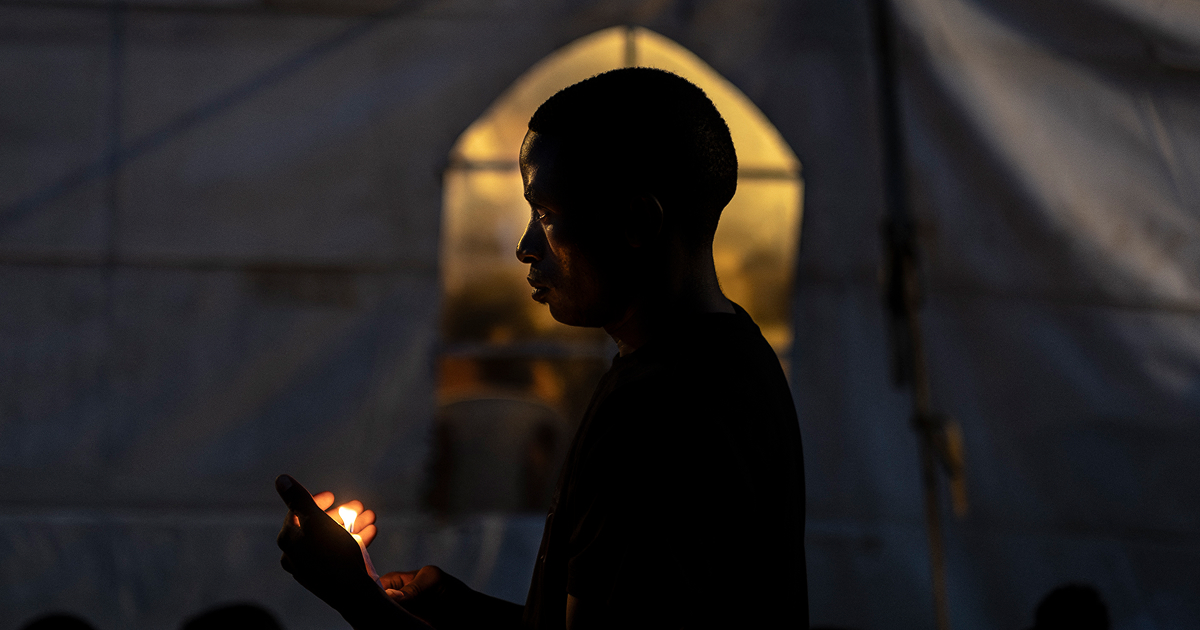The first conceptual seeds of George Orwell's novel 1984 can be traced back to his essay "London Letter", written in 1944, in which he expressed fears about the potential rise of totalitarian regimes and the increasing surveillance capabilities of modern governments.
Today, 80 years after this essay and 40 years after the setting of the novel, a part of Orwell's dystopian vision has become a factual reality in modern Britain. Thought crime, the act of thinking something that contradicts the government's official doctrine, now exists.
This is not hyperbole. The British government has made it a criminal offence to attempt to influence a person’s decision to access abortion services within 150 metres of an abortion clinic. According to the Home Office, this kind of influence includes “silent prayer". It stands in stark contrast to the words of the former home secretary, Suella Braverman, who wrote to police forces in 2023 to make it clear that “silent prayer, in itself, is not unlawful".
It will be at the discretion of the police to determine whether someone has been praying silently, but anyone found guilty of breaking the new law will face an unlimited fine.
How will the police use this discretion? Outwardly religious people, who are standing within the zones, are much more likely to be praying or considering praying. It is fair to say that a priest in a cassock fits this bill, and so does a grandmother who instinctively carries rosary beads.
In 2023, when Birmingham City Council implemented a public space protection order (PSPO) around abortion centres that paved the way for this new law, Father Sean Gough was charged with “intimidating service-users” at the abortion facility, in part for having a pro-life bumper sticker.
It will likely start with Christians, but other religions generally oppose abortion, so a police officer might guess that anyone looking religious in which ever form could be praying too. Perhaps a man in a Jewish kippah or a woman in a Muslim headscarf. Police using their discretion would logically target these people.
That is what it means to use your discretion, to use your judgement, and if you are a police officer, your judgement should assume that a religious person is more likely to be silently praying and therefore more likely to be "guilty" of the "offending crime".
There are 366 abortion providers in England and Wales, according to the government's own 2023 statistics. The combined area covered by the buffer zones will therefore add up to 25,870,710 square metres. This is about 0.02 per cent of England and Wales. This means the government has imposed restrictions on the thoughts of people within 0.02 per cent of the geographical area of the country.
Within these buffer zones are schools, parts of universities, and various other non-abortion-related institutions. If a teacher is holding a debate in an A-level ethics class around the rights and wrongs of abortion, a police officer would be well within their rights to use their “discretion” to charge the teacher and participating students. If a Catholic church or school, as often happens, engaged in prayers for the rights of all people, from conception to natural death, to be respected, a police officer could yet again use their discretion.
A singular limit of 150 metres (or 164 yards) is not that far, admittedly. About 10,000 pro-lifers made a journey across the country, from as far as the Outer Hebrides and the likes of Cornwall, to attend this year's March for Life in London. They thought nothing of making the journey to show their support for the most vulnerable. It stands to reason that they will be willing to still pray and offer support at the extended distance outside the 150 metres.
So what will happen then? The territories will be extended. It will be 200 metres, then 500, and then more yet. It will become illegal to pray silently about abortion.
Ingsoc, the ruling party in 1984, did not just appear as an all-powerful state. Successful totalitarian states, whether real or imagined, rarely do. Absolute control is born out of impositions on personal freedom in the name of alleged greater goods, out of silencing dissenting voices. They rely on the snowball effect; the more rights they take away, the easier it is to take what is left.
It is important to remember that Catholics are not supposed to obey these types of draconian laws. They are not called to submit to this tyrannical type of government. They are called to resist, to pray where they want to pray, to do their best to dismantle the impositions on conscience. Because, if they do not resist, this will certainly not be the last imposition.
On 31 October, Labour took away the right to private thought across 0.02 per cent of England and Wales. If we do not resist, they will come for the rest of it.
RELATED: ‘NOW IN FORCE’: Big Brother law banning silent prayer comes into effect in England and Wales
Photo: A protester holds a German translation of George Orwell's book '1984' in Berlin, Germany, 1 August 2015. (Photo by Adam Berry/Getty Images)
The first conceptual seeds of George Orwell's novel <em>1984 </em>can be traced back to his essay "London Letter", written in 1944, in which he expressed fears about the potential rise of totalitarian regimes and the increasing surveillance capabilities of modern governments.
Today, 80 years after this essay and 40 years after the setting of the novel, a part of Orwell's dystopian vision has become a factual reality in modern Britain. Thought crime, the act of thinking something that contradicts the government's official doctrine, now exists.
This is not hyperbole. The British government has made it a criminal offence to attempt to influence a person’s decision to access abortion services within 150 metres of an abortion clinic. <a href="https://www.gov.uk/government/news/abortion-service-protection-zones-in-place-in-england-and-wales"><mark style="background-color:rgba(0, 0, 0, 0)" class="has-inline-color has-vivid-cyan-blue-color">According to the Home Office</mark></a>, this kind of influence includes “silent prayer". It stands in stark contrast to the words of the former home secretary, Suella Braverman, <a href="https://x.com/SuellaBraverman/status/1697905696145092684?s=20"><mark style="background-color:rgba(0, 0, 0, 0)" class="has-inline-color has-vivid-cyan-blue-color">who wrote to police forces</mark></a> in 2023 to make it clear that “silent prayer, in itself, is not unlawful".
It will be at the discretion of the police to determine whether someone has been praying silently, but anyone found guilty of breaking the new law will face an unlimited fine.
How will the police use this discretion? Outwardly religious people, who are standing within the zones, are much more likely to be praying or considering praying. It is fair to say that a priest in a cassock fits this bill, and so does a grandmother who instinctively carries rosary beads.
In 2023, when Birmingham City Council implemented a public space protection order (PSPO) around abortion centres that paved the way for this new law, Father Sean Gough was charged with “intimidating service-users” at the abortion facility, in part for having a pro-life bumper sticker.
It will likely start with Christians, but other religions generally oppose abortion, so a police officer might guess that anyone looking religious in which ever form could be praying too. Perhaps a man in a Jewish <em>kippah</em> or a woman in a Muslim headscarf. Police using their discretion would logically target these people.
That is what it means to use your discretion, to use your judgement, and if you are a police officer, your judgement should assume that a religious person is more likely to be silently praying and therefore more likely to be "guilty" of the "offending crime".
There are 366 abortion providers in England and Wales, according to the government's own 2023 statistics. The combined area covered by the buffer zones will therefore add up to 25,870,710 square metres. This is about 0.02 per cent of England and Wales. This means the government has imposed restrictions on the thoughts of people within 0.02 per cent of the geographical area of the country.
Within these buffer zones are schools, parts of universities, and various other non-abortion-related institutions. If a teacher is holding a debate in an A-level ethics class around the rights and wrongs of abortion, a police officer would be well within their rights to use their “discretion” to charge the teacher and participating students. If a Catholic church or school, as often happens, engaged in prayers for the rights of all people, from conception to natural death, to be respected, a police officer could yet again use their discretion.
A singular limit of 150 metres (or 164 yards) is not that far, admittedly. About 10,000 pro-lifers made a journey across the country, from as far as the Outer Hebrides and the likes of Cornwall, to attend this year's March for Life in London. They thought nothing of making the journey to show their support for the most vulnerable. It stands to reason that they will be willing to still pray and offer support at the extended distance outside the 150 metres.
So what will happen then? The territories will be extended. It will be 200 metres, then 500, and then more yet. It will become illegal to pray silently about abortion.
Ingsoc, the ruling party in <em>1984</em>, did not just appear as an all-powerful state. Successful totalitarian states, whether real or imagined, rarely do. Absolute control is born out of impositions on personal freedom in the name of alleged greater goods, out of silencing dissenting voices. They rely on the snowball effect; the more rights they take away, the easier it is to take what is left.
It is important to remember that Catholics are not supposed to obey these types of draconian laws. They are not called to submit to this tyrannical type of government. They are called to resist, to pray where they want to pray, to do their best to dismantle the impositions on conscience. Because, if they do not resist, this will certainly not be the last imposition.
On 31 October, Labour took away the right to private thought across 0.02 per cent of England and Wales. If we do not resist, they will come for the rest of it.
<a href="https://catholicherald.co.uk/now-in-force-big-brother-law-banning-silent-prayer-comes-into-effect-in-england-and-wales/?swcfpc=1"><strong><em><mark style="background-color:rgba(0, 0, 0, 0)" class="has-inline-color has-vivid-cyan-blue-color">RELATED: ‘NOW IN FORCE’: Big Brother law banning silent prayer comes into effect in England and Wales</mark></em></strong></a>
<em>Photo: A protester holds a German translation of George Orwell's book '1984' in Berlin, Germany, 1 August 2015. (Photo by Adam Berry/Getty Images)</em>


















